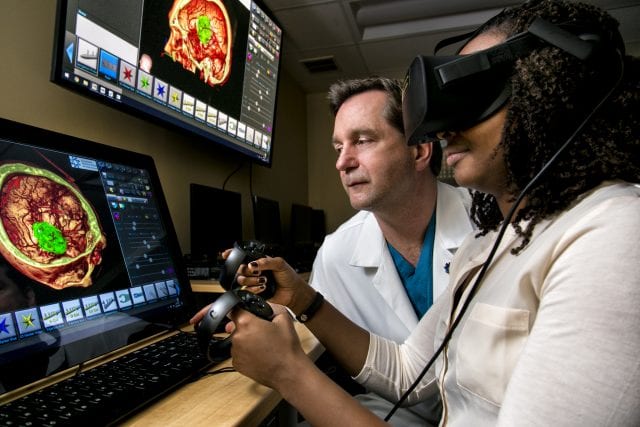Virtual Reality Technology Helps Neurosurgeons Achieve Optimal Results
JFK Neuroscience Institute is First In New Jersey to Introduce Precision 1Virtual Reality Medical Visualization Platform.

An early adopter of VR technology, being the only center in New Jersey and 1 of 20 centers nationally, JFK Medical Neuroscience Institute now is using Precision Virtual Reality medical visualization platform (VR) by Surgical Theatre™ in independent research. Surgeons access files from a patient’s traditional image modalities, such as CT or MRI scans, to reconstruct patients’ anatomy. These patient-specific, VR reconstructions are used to help plan surgery, and educate patient about their neurological condition.
The virtual reality device combines flight simulation technology with a patient’s own diagnostic scans to create a 3D, 360-degree room-scaled replica of the patient’s anatomy. Well in advance of surgery, neurosurgeons slip on a virtual reality headset and see exceptionally detailed images to determine the best strategy to target pathologies while preserving normal tissue to achieve optimal outcomes. The technology also gives patients and their families the same visuals so they can become more immersed in the treatment planning and decision-making process.
With the VR technology, surgeons can move very quickly through the brain and locate medical issues such as a tumor or an aneurysm and study it from every angle. According JFK Neuroscience Institute’s chairman, Dr. Thomas Steineke, “virtual reality is easing the patients’ anxiety about brain surgery.” VR is especially useful when developing a patient-specific intricate surgical plan.
Dr. Steineke is also is leading the institute in applying and studying frameless stereotactic neuronavigation to improve the safety and efficacy of extended endonasal, skullbase and intracranial surgery. “Combining the most up-to-date frameless stereotactic neuronavigation available with surgical theater and Al, we are investigating ways to improve pre-operative planning to minimize injury from the surgical approach and to maximize the effectiveness of surgery,” Dr. Steineke adds.

